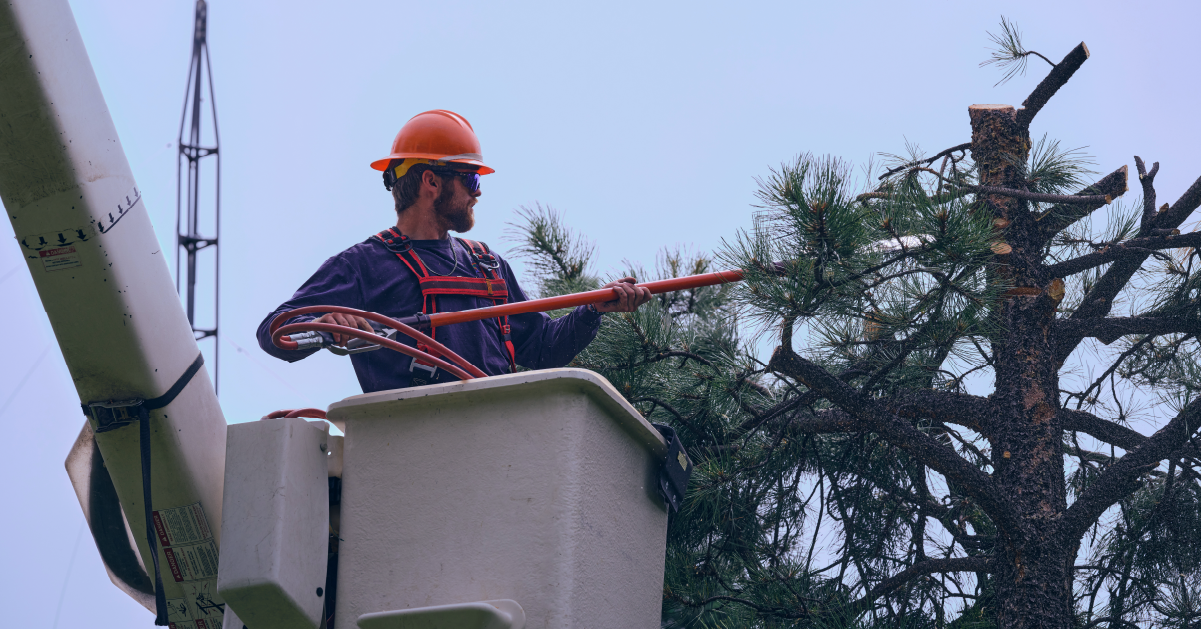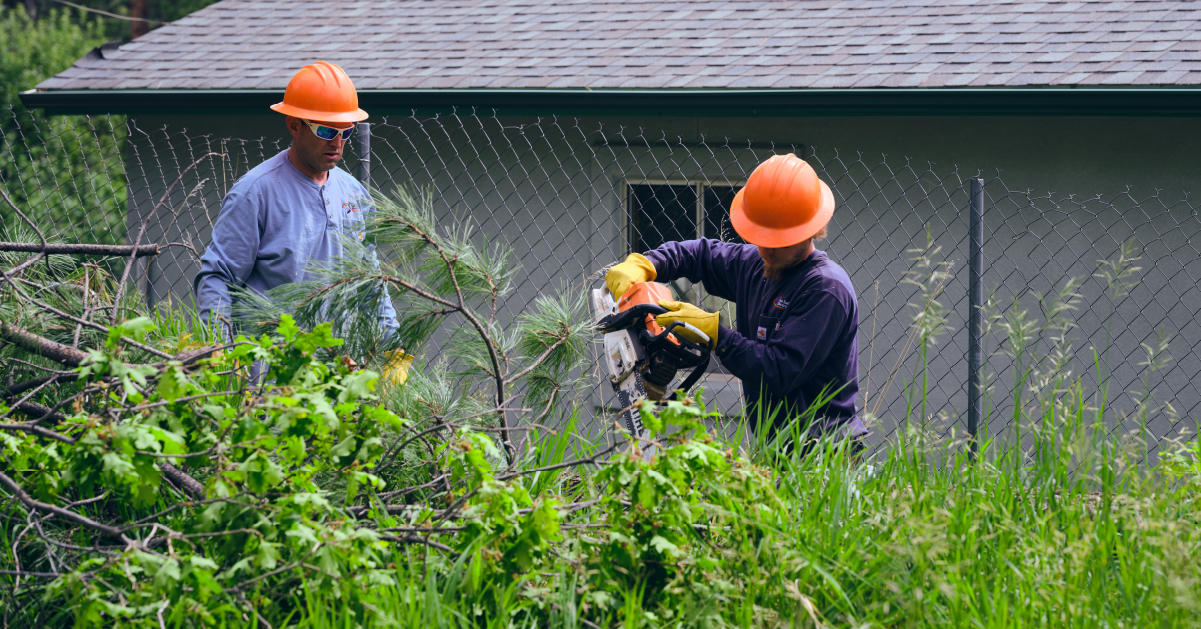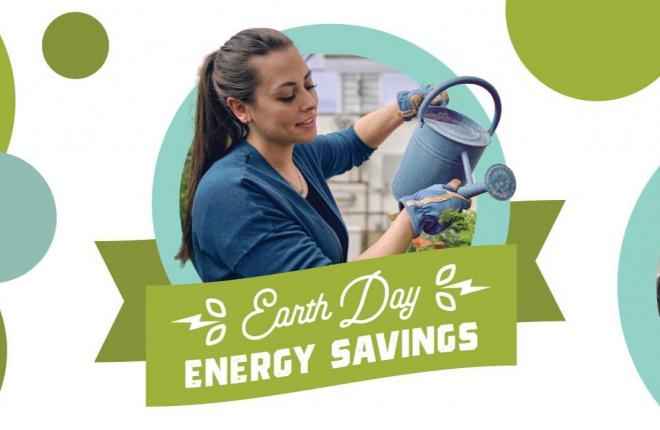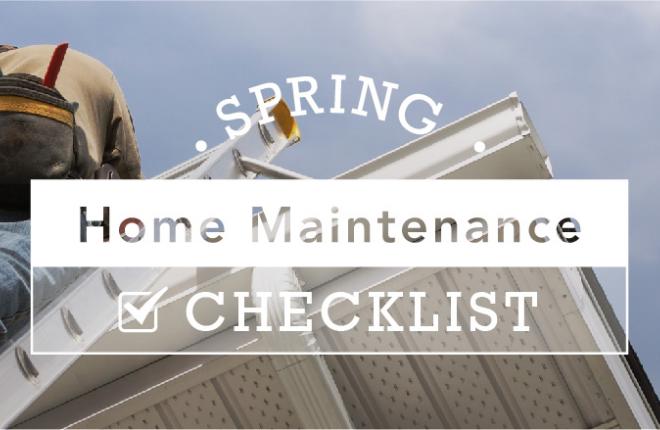
Vegetation Management: What It Is and Why It Works
Tri-State’s mission is to provide reliable, affordable and responsible energy to our members and that work includes planning ahead to avoid risks to our transmission system that can cause power outages. These power outages can be caused in many ways, such as: a car hit a pole, lightning struck a transformer or a storm caused a tree to come in contact with a line. While we can’t predict a car crash or mother nature taking its course, we can responsibly manage vegetation in our right-of-ways to help minimize risks from trees, branches and other types of vegetation that could interfere with our transmission lines and cause damage.
Vegetation management refers to the targeted control or elimination of unwanted vegetation like weeds, bushes, branches and trees. One common vegetation management practice for Tri-State is the removal of “danger trees”, which could be a tree that’s leaning towards our lines or is dead, decaying or could contact our lines.
As a transmission provider, Tri-State is regulated by the North American Electric Reliability Corporation (NERC) and we adhere to their reliability standards. NERC Reliability Standards use a results-based approach focusing on performance, risk management and competency. Vegetation management is a requirement within NERC Reliability Standards.
At Tri-State, vegetation management is based on inspection through standard maintenance protocol. Every line is inspected annually, whether by ground or aerial patrol, except for higher risk lines which are inspected by ground patrol annually. During ground patrol, crews walk or drive along the transmission line right-of-way identifying potentially hazardous vegetation. Aerial patrols use a helicopter, drones or other appropriate technology.
Once hazardous vegetation is detected, crews evaluate which trees can be cut safely and without danger of contacting a line. If there are no safety issues, crews are typically able to remove the hazard fairly quickly. If the tree could fall on or come into close proximity to a line, an outage or hot line hold is scheduled with System Operations. The process can take up to a month while affected parties are notified and crews plan the safest route for removing the hazard.

Large-scale projects occur when an area is identified that crews have spent a substantial amount of time in trying to keep it clear or an area that has significant trees or branches that need cleared.
Doug Dean manages Tri-State’s West Maintenance region which spans the western and southern portions of Colorado. “A lot of the lines I manage in the West were built in the seventies,” he explained. “The goal of the Forest Service in the seventies was to use vegetation and terrain to hide power lines so some of the clearing we’re doing now is to get us up-to-date on today’s standards.”
From budgeting and accepting bids from contractors to conducting environmental and archaeology studies, projects require coordination among many stakeholders. Tri-State is fortunate to have a talented and dedicated Lands and Environmental team instrumental in getting projects permitted by private and public entities.

“We all work together as one,” said Tri-State’s Line Supervisor Brad Hauger. “We have everyone’s best interests in mind during these projects.”
Brad plays a key role in several large-scale projects for Tri-State and doesn’t take clearing a right-of-ways lightly. “From a safety aspect, for my line crews and the public, these large-scale projects are crucial.”
Tri-State respects the lands and people affected by large-scale projects so communication begins as soon as a project is identified. The Tri-State project team communicates all that could be affected.
Private landowners, and counties, cities and towns, most affected are brought into early conversations, which helps build public understanding on the need for projects and provides project planners with important local perspectives. Tri-State also engages with our members if a project is located in their service territory to help ensure they have the information they need.
Landowners typically have the option of keeping as much of the material (timber) as they would like. Otherwise, the contractor Tri-State hires is responsible and works with the public land managers to decide what to do with the material. Sometimes the material is sold for repurposing or given away as firewood or mulch for the local community. If the project is on public land, Tri-State may pay a fee for the materials' worth based on timber market values.
Some public inconveniences during a vegetation management project are unwanted noise or traffic delays, but Tri-State is committed to sharing information, listening to public concerns and questions, and safely working as quickly as possible.
--
About Tri-State
Tri-State is a power supply cooperative, operating on a not-for-profit basis, serving electric distribution cooperatives and public power district member-owners in four states. Together with our members, we deliver reliable, affordable and responsible power to more than a million electricity consumers across nearly 200,000 square miles of the West. Visit www.tristate.coop.
Blog Posts

Common Summer Electrical Problems to Avoid

Outdoor Cooking with Electric Grills

Earth Day 2021 Energy Saving Tips

Home Maintenance Checklist for Spring

The Surge of Electric Vehicles in 2021

Spring Road Trip Tips in Your EV

Electric Vehicles in Colorado: How Tri-State is Helping Members Transition

Electric Trucks May Be the Future for The Rockies

